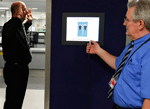The Obama administration’s decision to subject travelers to the U.S. from 14 listed nations to extra airport security screening has drawn sharp criticism both internationally and from domestic civil liberties groups.

|
|
A security official (R) prepares to scan his colleague posing inside a RapiScan full-body scanner being trialled by Manchester Airport during a photocall at the airport in Manchester, northern England January 7, 2010. The radiation risk from full-body scanners used to improve airport security is low and unlikely to raise an individual’s risk of cancer, U.S. experts said. Airports in Britain, the Netherlands and Canada have said they plan to use full-body scanners to foil future terror attempts like the Christmas Day attempt to blow up a Detroit-bound flight. The United States has tested 40 whole-body scanners as part of a pilot program started after the Sept. 11 attacks, and this past October ordered 150 more. REUTERS/Phil Noble |
The list includes Afghanistan, Algeria, Cuba, Lebanon, Libya, Iran, Iraq, Nigeria, Pakistan, Saudi Arabia, Somalia, Sudan, Syria and Yemen.
The Washington-based Muslim Public Affairs Council on Monday called the decision counterproductive.
“The new TSA guidelines deliver a propaganda victory to Al-Qaeda and other violent extremist groups, since they rob targeted groups of people from their civil liberties based on their ethnicity and country of origin,” said MPAC Government Liaison Alejandro Beutel. “Call it whatever you want, but this is religious and ethnic profiling at its worst.”
Algerian ambassador to the United States, Abdallah Baali, told The New York Times on Monday he would file a protest once he was given formal notice of the change.
“The United States has the right to protect the security of its citizens, but this is discrimination against the citizens of Algeria, who do not pose any particular risk to the people of the United States,” he said.
Nigeria’s Minister of Information and Communications Dora Akunyili protested her country’s inclusion on the list.
“It is unfair to discriminate against over 150 million people because of the behaviour of one person,” she said. “Abdulmutallab was a well-behaved child from a responsible family who developed the ugly tendency to do what he tried to do because of the exposure outside the shores of Nigeria. Generally, no Nigerian wants to die. We are peace-loving and happy people.”
American-Arab Anti-Discrimination Committee leaders said Tuesday the group is troubled by the new guidelines.
“Such directives will have negative ramifications on Arab-Americans, citizens of the 14 countries, and all Americans who visit these countries,” the group said in a statement. “A disparate segment of the Arab American community will be scrutinized because of these new guidelines. The blanket labeling of hundreds of millions of civilians based solely on their country of citizenship or travel is not only unfairly discriminatory based on national origin, but also improperly labels millions of innocent people as somehow suspect or possible terrorists.”
The Transportation Security Administration has defended the decision, saying the enhanced security measures imposed on all passengers following the failed attempt to blow up a U.S.-bound passenger jet on Christmas Day would be too disruptive to continue. Officials consulted with the State Department and narrowed the list of countries where populations would be more likely to include terrorism suspects.
“T.S.A. does not profile,” said agency spokeswoman Kristin Lee. “As is always the case, T.S.A. security measures are based on threat, not ethnic or religious background.”
Cuba on Wednesday formally protested the measures in a meeting with the top U.S. diplomat there. Josefina Vidal Ferreiro, director of the Cuban Foreign Ministry’s North American affairs office, called the decision “discriminatory and selective.”
“We categorically reject this new hostile action by the government of the United States against Cuba,” she told The Associated Press.






Leave a Reply